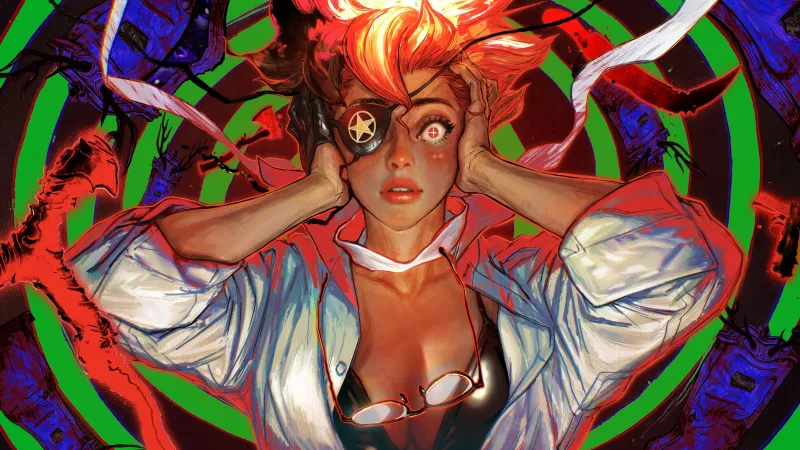
I repeatedly asked myself one question while playing Hotel Barcelona: Why?
Why is the demonic spirit of a serial killer possessing a timid US Marshal? Why is the promising-looking combat so bland? Why is the storytelling so half-baked? Why does the game look as though it emerged from a time capsule from the mid-2000s? I don’t have the answers to most of these questions, but I know one thing: This collaboration between White Owls, the studio led by Deadly Premonition mastermind Swery, and Suda51 of Grasshopper fame, is a bad time. It also encapsulates the main critique of both creators’ works: an abundance of surreal humor and style, but severely lacking in polished substance.
Hotel Barcelona is a 2D action roguelike that sees players fighting across the grounds of the eponymous cursed hotel. As Justine, you’re a government agent looking to avenge your father’s murder by taking down a powerful witch with the supernatural assistance of Dr. Carnival, a murderous spirit inhabiting Justine’s body. This intriguing setup, and the dynamic between the shy Justine and ruthless Carnival, can lead to mildly amusing moments, but the payoff is neither interesting nor entirely coherent. Unfortunately, the action isn’t much better.
The game’s roguelike runs consist of time-limited romps through four stages of a level, which is assigned a random weather effect and time of day. You have upwards of two or three minutes to explore a stage before exiting one of several doors to the next area, granting bonuses like increased attack speed or health regeneration. I like that runs are mercifully short, because the mediocre combat lacks enough punch or finesse to make Justine’s revenge quest satisfying.
Slicing foes apart with various weapons like knives, axes, or buzzsaws, or gunning them down with pistols, shotguns, and other ranged options, feels just south of “fine” even after unlocking combos and other upgrades from a skill tree. To its credit, Hotel Barcelona has a few novel ideas. Weather comes into play by affecting how long it takes to build up Dr. Carnival’s special attack, a meter filled by coating Justine in the blood of the foes she slays. Rainy weather rinses the blood off her body, making it tougher to build toward unleashing this screen-filling attack to add a decent challenge.
One interesting concept is playing alongside the “ghosts” of your previous runs through a stage, who can attack any enemies caught in their predetermined path. These can be helpful, but are more unreliable than anything. You can also be invaded and killed by other players (and do the same to them) Dark Souls-style, but this happens so infrequently (possibly due to a low player count) that it’s virtually a non-factor. When someone did arrive and took my life, I cursed them for extending my time in Hotel Barcelona’s world.
The bland assortment of enemies similarly lacks punch, and some unleash infuriatingly cheap attacks that can stun-lock Justine to an early grave. Boss battles, such as ones against a deranged butcher or an alien social media influencer, commit the same sins, and I never looked forward to facing them time and again to farm upgrade resources. While the combat is unremarkable at worst, other gameplay diversions, such as a platforming sequence across a crumbling arena or a QTE-driven surfing segment, are outright terrible due to poor controls and a dated presentation.
Despite Hotel Barcelona seemingly taking the Hades route of advancing the story and unlocking new character conversations between runs, non-critical threads go nowhere, even though some present interesting personalities. I hoped to learn more about Barcelona’s strange patrons, such as an ear-obsessed bartender, a friendly monster living in Justine’s closet, and an unsettlingly chipper receptionist, so I was disappointed that their character development gets cut off at the knees so unexpectedly as the game approaches its climax. Justine’s quest to collect the hearts of three bosses to face the witch is shockingly short, padded by an unnecessary and tedious story mission to recollect these hearts by replaying the same (albeit shorter) stages. This culminates in an insultingly abrupt ending that sheds practically no light on the witch’s motives, the larger backstories of the hotel patrons, and Dr. Carnival’s true nature, which is only briefly teased.
Perhaps these threads become more fleshed out after reaching the two unlockable, seemingly optional worlds, but the secret method of reaching them appears annoyingly vague. And believe me, I tried. I even replayed the final section to reach the game’s one big decision, then made the opposite choice I had before, only to find there is no choice. You’re forced into making the same decision no matter what, offering another example of how Hotel Barcelona shoots its promising narrative ideas in the foot at every turn. Whatever remaining secrets may lie beneath, I have no interest in seeing them.
I know the charm of Swery games (and, to a lesser extent, Suda51 titles) is how utterly bizarre they are, but any chuckles Hotel Barcelona’s quirky sense of humor may elicit were drowned under a sea of head-scratching and outright bad design and storytelling decisions. No matter how many secrets it may have or surreal moments it assaults players with, it’s all wrapped around a dull, limited, and flawed core gameplay experience. You don’t have to go home, but you shouldn’t stay here.
